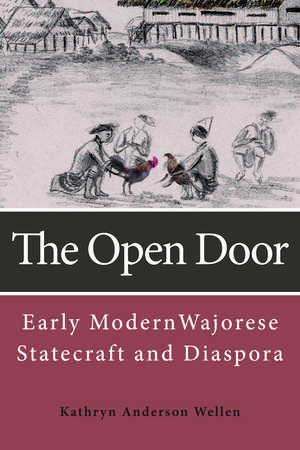The Open Door: Early Modern Wajorese Statecraft and Diaspora
Autor Kathryn Anderson Wellenen Limba Engleză Paperback – 14 feb 2015
The Wajorese people were one of many groups that spread across Indonesian during the early modern era. In the wake of the Makassar War (1666–1669), the Dutch took control of Makassar on the Indonesian island of Sulawesi and used it to consolidate their power in the region. Because the Wajorese had sided with the war’s losers, they were treated very harshly and many opted to emigrate. They scattered far and wide across the Southeast Asian archipelago, settling in eastern Kalimantan, western Sumatra, the Straits of Malacca, and the Sulawesian port city of Makassar.
Wellen reconstructs the fascinating and little-told story of the Wajorese diaspora. Wajorese migrants exhibited remarkable versatility in adapting to local conditions in the areas where they settled. They perpetuated their own culture overseas while simultaneously using various assimilation strategies such as intermarriage to thrive in their adopted homelands. Relations between Wajorese migrants and their homeland intensified in the early 18th century when successive rulers in Wajoq deliberately sought to harness the growing military and commercial potential of the migrant communities. This effort culminated in the 1730s when the exiled La Maddukelleng, an Indonesian national hero, returned to Makassar from neighboring eastern Kalimantan and attempted to expel the Dutch from South Sulawesi. His campaign exemplifies the manner in which overseas Wajorese remained an essential part of Wajoq long after they left home.
The Open Door’s strong thematic organization allows readers with specific interests such as commercial law, family networks, diaspora, and comparative politics to quickly find fascinating and relevant information about this lesser-known Southeast Asian society.
Wellen reconstructs the fascinating and little-told story of the Wajorese diaspora. Wajorese migrants exhibited remarkable versatility in adapting to local conditions in the areas where they settled. They perpetuated their own culture overseas while simultaneously using various assimilation strategies such as intermarriage to thrive in their adopted homelands. Relations between Wajorese migrants and their homeland intensified in the early 18th century when successive rulers in Wajoq deliberately sought to harness the growing military and commercial potential of the migrant communities. This effort culminated in the 1730s when the exiled La Maddukelleng, an Indonesian national hero, returned to Makassar from neighboring eastern Kalimantan and attempted to expel the Dutch from South Sulawesi. His campaign exemplifies the manner in which overseas Wajorese remained an essential part of Wajoq long after they left home.
The Open Door’s strong thematic organization allows readers with specific interests such as commercial law, family networks, diaspora, and comparative politics to quickly find fascinating and relevant information about this lesser-known Southeast Asian society.
Preț: 300.90 lei
Nou
Puncte Express: 451
Preț estimativ în valută:
57.58€ • 60.39$ • 47.93£
57.58€ • 60.39$ • 47.93£
Carte tipărită la comandă
Livrare economică 01-15 aprilie
Preluare comenzi: 021 569.72.76
Specificații
ISBN-13: 9780875807126
ISBN-10: 0875807127
Pagini: 220
Ilustrații: 9
Dimensiuni: 152 x 229 x 18 mm
Greutate: 0.32 kg
Ediția:1
Editura: Northern Illinois University Press
Colecția Northern Illinois University Press
ISBN-10: 0875807127
Pagini: 220
Ilustrații: 9
Dimensiuni: 152 x 229 x 18 mm
Greutate: 0.32 kg
Ediția:1
Editura: Northern Illinois University Press
Colecția Northern Illinois University Press
Recenzii
“Kathryn Wellen’s book is an important contribution to the study of early Indonesian history, and is likely to catch the interest even of people not specialized in the field. . . . It is based on a variety of sources and shows how history can be enriched by anthropological perspectives.”
—HumaNetten
“By drawing together much material which has until now been poorly understood, The Open Door makes sense of the Wajorese diaspora in western Indonesia and Malaysia. Its account of Wajorese identity and statecraft, built on indigenous Bugis sources and the work of contemporary anthropologists, provides completely new insights.”
—Campbell Macknight, Australian National University
“The Open Door is an original contribution to the literature on Southeast Asian history. Wellen has the linguistic capacities to work in this difficult field. She uses both published and archival Dutch sources as well as the main extant published Bugis sources from and about Wajoq. I know of no significant sources that she has overlooked.”
—William S. Cummings, University of South Florida
—HumaNetten
“By drawing together much material which has until now been poorly understood, The Open Door makes sense of the Wajorese diaspora in western Indonesia and Malaysia. Its account of Wajorese identity and statecraft, built on indigenous Bugis sources and the work of contemporary anthropologists, provides completely new insights.”
—Campbell Macknight, Australian National University
“The Open Door is an original contribution to the literature on Southeast Asian history. Wellen has the linguistic capacities to work in this difficult field. She uses both published and archival Dutch sources as well as the main extant published Bugis sources from and about Wajoq. I know of no significant sources that she has overlooked.”
—William S. Cummings, University of South Florida
Notă biografică
Kathryn Anderson Wellen is a researcher at the Royal Institute for Southeast Asian and Caribbean Studies (KITLV) in Leiden, The Netherlands.
